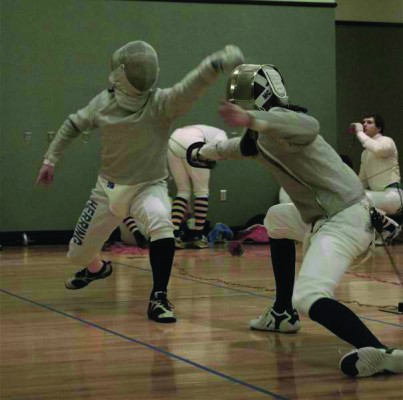Fencing, has become a dying sport in the world today.
But that is slowly changing as collegiate fencing programs are sprouting up throughout the nation, forming their own conferences and competing in tournaments.
With a new president leading the way, Mason’s fencing team is looking to make its mark on Mason sports, clinch the division and go even further in their quest for success.
Since its formation in 2008, the team has managed to maintain the number one seed in their conference this season.
With one tournament under their belts, Mason’s fencing team won gold in the individual fencing tournament on Oct. 14 and are looking to defend this title in their upcoming tournament on Nov. 18 at Saint John’s University.
“Our conference is a large one with two new additions, including Drexel and Georgetown,” captain Khalfan Javaid said. “There are excellent teams with great coaching and we have to work hard to be the best.”
Their number one title has come with a lot of determination and dedication as the team is one of the few in the conference without a coach.
“Since we do not have a coach, we have to put more research into the sport and work harder,” Khalfan said. “It is a disadvantage, but we are up to the challenge.”
While not having a coach is not as imperative in regular sports, it is much more significant in fencing due to the mental toughness required for the sport.
Fencing requires patience and perfection of skill and form with less physical contact like basketball or football.
“It is not just swinging a sword like everyone thinks,” Khalfan said, “There is much more skill and technique required than most people think.”
Since fencing is not a well known sport, the collegiate teams are highly dedicated to advertising the sport and getting others involved.
While the sport itself is highly competitive, members of different teams become friends and share a sense of camaraderie.
They are appreciative of the difficulty of the sport and help each other out despite the rivalry on the strip.
“Because we do not have a coach, the coach at the Naval Academy invites me to practice sessions once a month,” Khalfan said. “He gives out the lessons to his rivals because he sees the potential in us and wants to further the sport, not because he is looking to crush the competition.”
Khalfan has worked hard at advertising the fencing club and is attempting to host a tournament at Mason for the spring semester.
He does find, however, that it is difficult to maintain a steady number of players throughout four years.
“If ten people come out for the season, it is likely only two or three will come back,” Khalfan said. “It is very different due to the mental toughness required, but it is a great club.”
The team is looking for both supporters and members for the season.







Comments